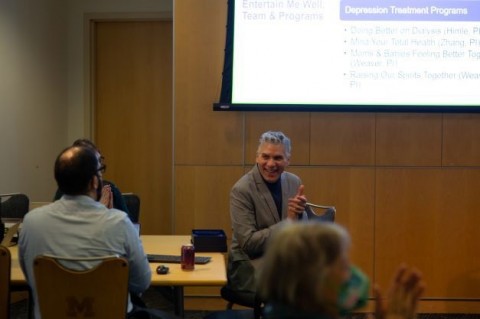2022 School of Social Work Innovations Award Recipients
May 6, 2022
The inaugural Innovation in Research and Teaching Award recognizes research — with either incremental innovation that builds over time, with its impact to be felt in the future, radical Innovations that current issues in the moment they occur and disruptive innovation that challenges the status quo — or existing theories, methods, and pedagogies.
Professor William Elliott III
Sowing Tangible Hope Intervention
Winning the war on poverty requires policies that provide families with enough to survive today but also policies that provide them with something to live for (i.e., a future). In poverty discussions, however, it is a foregone conclusion that policies focused on providing children enough to eat, shelter, and cloth should come before policies focused on children’s futures.
Associate Professor Beth Glover Reed and Professor Larry Gant
Configuration Theory and Set-Theoretic Methods [emphasizing fuzzy set Qualitative Comparative Analysis (fsQCA)]: Operationalizing Critical Intersectionality in Research and Generalizing from Small Sample Sizes with Many Variables per Case
Fuzzy set Qualitative Comparative Analysis (fsQCA) uses Configuration Theory and Set-Analytic Methods to examine complex patterns within cases to identify necessary and sufficient conditions for particular outcomes and variations among cases with different combinations of factors. fsQCA combines strengths of qualitative approaches with statistical calibrations to determine generalizability of results.
Professor Brian Perron
The Democratization of Data, Technology, and Artificial Intelligence: Opportunities for Innovating Social Work Education and Practice
The no-code movement allows people without a background in software development to become citizen developers. This means social workers can create professional data products and information systems without writing a single line of code. Using a no-code approach, I am teaching students how to:
-
automate routine administrative reports;
-
engineer workflows to efficiently move data and tasks among team members;
-
create efficient tracking and scheduling systems;
-
eliminate duplicate data entry by integrating disparate data sources;
-
develop custom project management systems;
-
build and maintain information-rich websites and resource centers;
-
analyze text data and classify images using off-the-shelf AI tools;
-
scrape websites to rapidly collect digital assets.
Professor Trina Shanks and Assistant Research Scientist Patrick Meehan
Innovation in Research: Visualizing Data for the Community
The Center for Equitable Family & Community Well-Being uses Google Data Studio to make research accessible through interactive dashboards. These visualizations allow users to filter data on demographics of interest, so they can guide their own inquiry of the data. These dashboards represent incremental innovations that share initial findings broadly and develop richness over time as additional data are added.
Assistant Professor Addie Weaver
Raising Our Spirits Together: A Research Innovation Increasing Access to Depression Treatment in Rural Michigan
Raising Our Spirits Together (ROST) bridges the rural mental health treatment gap by offering a group-based, technology-assisted cognitive-behavioral therapy (CBT) for depression, delivered by clergy. Co-developed by community partners, ROST includes images, quotes, and examples relevant for the rural context and delivery by clergy. ROST was designed to be engaging, using an animated, character-driven storyline to illustrate core CBT skills.
